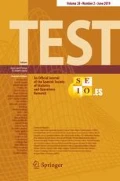Abstract
The paper considers model-based inference for finite population parameters under informative sampling, when the draws of the different units are not independent and the joint selection probability is modeled using a copula. We extend the “sample likelihood” approach to the case of dependent draws and provide the expression of the likelihood given the selected sample, called here “selection likelihood”. We show how to derive maximum likelihood estimators of the model parameters based on the resulting selection likelihood. Further, we find optimal predictors of individual values and of finite population parameters under the proposed informative selection models. In an experiment based on the 1988 U.S. National Maternal and Infant Health Survey, results indicate that, for small sample size, the proposed selection likelihood method reduces systematically the bias and standard errors of the estimators obtained from the sample likelihood based on independent draws and become the same for large sample size. It reduces considerably the bias due to informativeness and gives more efficient estimators than the pseudo likelihood (or quasi-likelihood) approach based on weighting the sample estimating equations by the survey weights.
Similar content being viewed by others
Code and data availability
Codes of simulations and required data can be found in https://github.com/isa-belmolina8/SelectionLikelihood.
References
Binder DA (1983) On the variances of asymptotically normal estimators from complex surveys. Int Stat Rev 51:279–292
Breidt FJ, Opsomer JD, Herndon W, Cao R, Francisco-Fernandez M (2013) Testing for Informativeness in analytic inference from complex surveys. In: Proceedings of 59th ISI WSC, Hong Kong
Genest C, MacKay RJ (1986a) Copules Archimediennes et Familles de Lois Bidimensionnelles Dont les Marges Sont Donnees. Can J Stat 14:280–283
Genest C, MacKay RJ (1986b) The joy of copulas: bivariate distributions with uniform marginals. Am Stat 40:549–556
Hájek J (1964) Asymptotic theory of rejective sampling with varying probabilities from a finite population. Ann Math Stat 35:1491–1523
Herndon W (2013) Testing and adjusting for informative sampling in survey data, Dissertation, Department of Statistics, Colorado State University
Korn EL, Graubard BI (1995) Examples of differing weighted and unweighted estimates from a sample survey. Am Stat 49:291–295
Lee AJ (1993) Generating random binary deviates having fixed marginal distributions and specified degrees of association. Am Stat 47:209–215
Little RJA (1982) Modes for nonresponse in sample surveys. J Am Stat Assoc 77:237–250
Nelson RB (2006) An introduction to copulas. Springer, New York
Pfeffermann D, Krieger AM, Rinott Y (1998) Parametric distributions of complex survey data under informative probability sampling. Stat Sinica 8:1087–1114
Pfeffermann D, Sverchkov M (1999) Parametric and semiparametric estimation of regression models fitted to survey data. Sankhya B 61:166–186
Pfeffermann D, Sverchkov M (2003) Fitting generalized linear models under informative sampling. In: Skinner C, Chambers R (eds) Analysis of survey data. Wiley, New York, pp 175–199
Pfeffermann D, Sverchkov M (2007) Small-area estimation under informative probability sampling of areas and within the selected areas. J Am Stat Assoc 102:1427–1439
Pfeffermann D, Sverchkov M (2009) Inference under informative sampling. In: Pfeffermann D, Rao CR (eds) Sample surveys: inference and analysis, vol 29B. Elsevier, North Holland, pp 455–487
Rubin DB (1976) Inference and missing data. Biometrika 63:581–592
Sugden RA, Smith TMF (1984) Ignorable and informative designs in survey sampling inference. Biometrika 71:495–506
Verret F, Rao JNK, Hidiroglou MA (2015) Model-based small area estimation under informative sampling. Surv Methodol 41:333–347
Author information
Authors and Affiliations
Corresponding author
Ethics declarations
Conflict of interest
The authors declare that they have no conflict of interest.
Additional information
Publisher's Note
Springer Nature remains neutral with regard to jurisdictional claims in published maps and institutional affiliations.
I. Molina’s work was supported by Grants MTM2012-37077-C02-01, MTM2015-69638-R and MTM2015-64842-P from the Spanish Ministry of Economy and Competitiveness. M. Ghosh’s research was partially supported by an NSF Grant SES-1327359.
Electronic supplementary material
Below is the link to the electronic supplementary material.
Rights and permissions
About this article
Cite this article
Molina, I., Ghosh, M. Accounting for dependent informative sampling in model-based finite population inference. TEST 30, 179–197 (2021). https://doi.org/10.1007/s11749-020-00708-0
Received:
Accepted:
Published:
Issue Date:
DOI: https://doi.org/10.1007/s11749-020-00708-0


